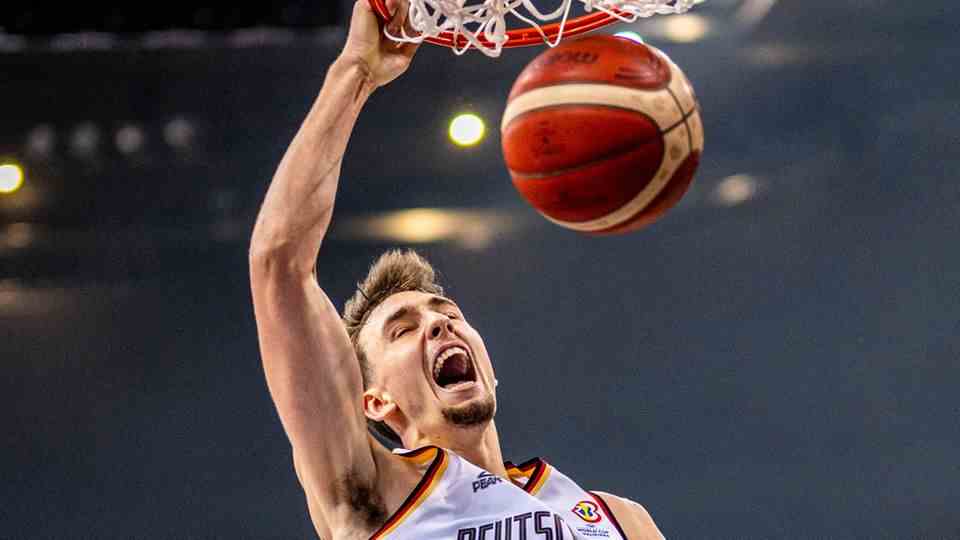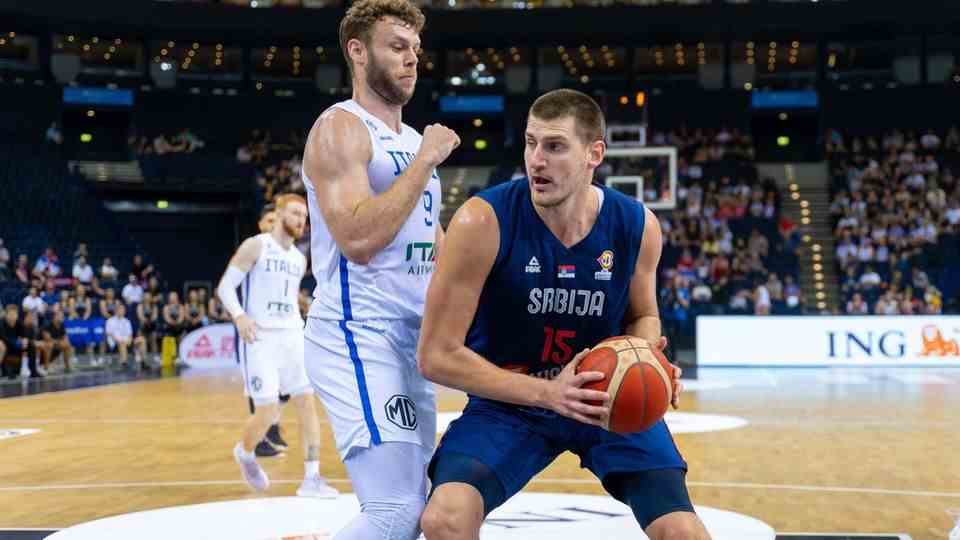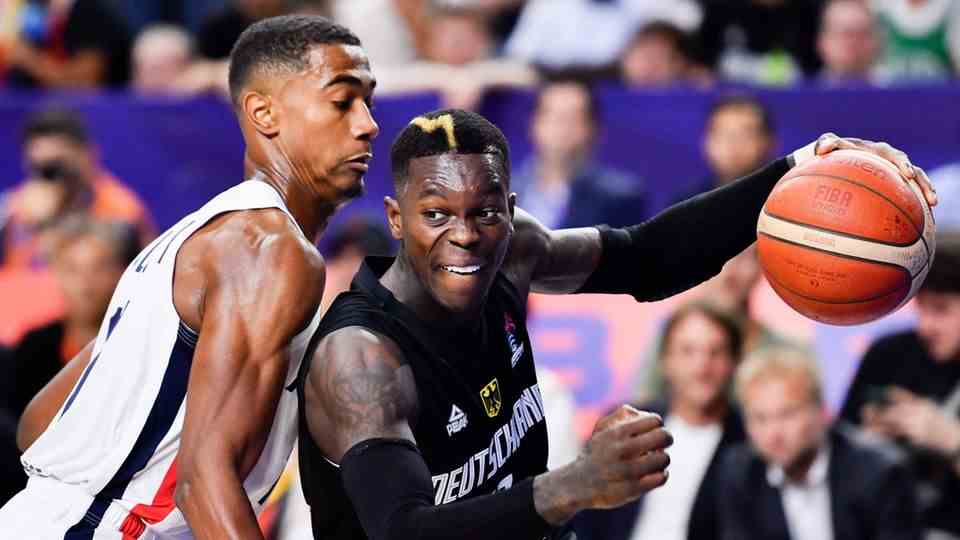The German team meets Greece and Giannis Antetokounmpo in the quarterfinals of the European Basketball Championship. The 27-year-old is one of the best basketball players in the world – with a life story straight out of Hollywood.
“It’s about controlling Giannis. I just don’t know how,” says national coach Gordon Herbert. “His athletics are from another planet,” enthuses Center Jonas Wohlfarth-Bottermann. “It’s almost impossible to stop Giannis,” notes point guard Dennis Schröder. Before their game against Greece (from 8:15 p.m. on RTL with Dirk Nowitzki as a guest), the German national basketball team knows only too well who they will be dealing with in the quarter-finals of the Eurobasket 2022: Giannis Antetokunmpo.
“The Greek Freak”, as the 27-year-old exceptional player is called, is one of the best basketball players in the world – according to many experts even the best. In the Greek team he is the lynchpin. The two-time “Most Valuable Player” of the US professional league NBA has contributed 29 points and 9.2 rebounds to the flawless tournament record of the men from Hellas. Star airs are foreign to the 2.11 meter tall superstar from the Milwaukee Bucks. “Giannis is so humble and committed. It’s the easiest thing to put him in your team,” says coach Dimitrios Itoudis of his key player, whose brothers Thanasis and Kostas are also in the squad.
Antetokunmpo’s humility is no accident. It’s rooted in a Cinderella story that Hollywood couldn’t have dreamed up any better: Giannis Sina Ougko Antetokounmpo was born in Athens, the third of five children of Nigerian immigrants. His parents Charles and Veronica experienced the vicious circle of many migrants: their immigrant status made it difficult for them to find steady work and without steady work they had no chance of Greek citizenship. The father, who had been a soccer player back home, and the mother, a high jumper, were struggling to get enough food on the table for their four sons – the eldest, Francis, had stayed in Nigeria.
Giannis Antetokunmpo grows up in great poverty
For Giannis, this meant that he had to help keep the family afloat from an early age. “I was always out of the house and tried to support my parents as much as I could by selling watches, glasses, CDs, DVDs and anything else I could find,” Antetokounmpo said US sports broadcaster ESPN his childhood. “I did that until I was 17 because I had to. I had no other choice. If I hadn’t sold anything, we wouldn’t have had food. Or if we sold something, we had to think about whether we were going to pay the rent or something wanted to buy food. It wasn’t easy.”
Even then, the ambition that distinguishes Antetokounmpo as a basketball player was evident: “I was the best at selling all these things,” he reported to ESPN. “My secret was that I never gave up. I kept asking people until I could get them to buy something. It also helped that I was young and cute.”
Despite the support of their children, the family was so poor that Giannis had to share a room with his older brother Thanasis, younger Kostas and baby Alex – two in a bunk bed, two on a couch. But the siblings not only shared their room, but also their clothes: “Alex took what I didn’t like. I took what Giannis didn’t like,” Kostas told the Bleacher Report. Sometimes even the food had to be shared, often a souvlaki, each taking a bite before handing it to the other, the US magazine reports.
Giannis has to share shoes with his brother
When Giannis, who originally wanted to be a soccer player like his father, and Thanasis, who was almost two and a half years his senior, started playing basketball, they also had to struggle with poverty there. Because the family couldn’t afford sneakers for both of them, the brothers had to share a pair. The author writes that her games often took place on Tuesday evenings, always one after the other Mirin Fader in her book “Giannis: The Improbable Rise of an NBA MVP”. Giannis had to wear two pairs of socks to fit Thanasis’ size 15 shoes when it was his turn with his team. He then gave the shoes to his older brother, who played in a higher league.
Later, when Giannis was taken under his wing by the Athens club Filathlitikos, he even slept on a floor mat in the gym to save money for the bus home: “He walked almost five miles a day, four to five miles around participate in the morning training because they usually train twice a day. And when they finished, and he was usually tired, he would come and often sleep here with his brother Kostas,” said Antetokounmpo’s agent Giorgos Panou. “That means if you came early, around lunchtime, you would see them mostly sleeping there. It was literally like a second home.”
Giannis Antetokounmpo is now miles away from the worries of his childhood: In 2020 he signed a maximum five-year contract with the Milwaukee Bucks and a total of $ 228.2 million – the largest deal in NBA history. Not only does his deal with sports outfitter Nike guarantee him never to share shoes with Thanasis again, it also reportedly nets him $10 million a year. In addition, the “Greek Freak” should earn nine million dollars a year with further advertising contracts.
However, Antetokounmpo did not let himself be changed by his rise to the world of the super-rich and superstars: “Growing up and going through life like this, and as hard as life was for me and my family, I will always remain humble,” he assured told ESPN in 2018. “It doesn’t matter if I have a $100 million contract or a $100 million deal with Nike, that’s how I grew up, that’s how I go through life. I won’t change.”
An anecdote shared by ESPN reporter Chris Haynes shows that Antetokounmpo has indeed stayed true to himself: “Having just finished practice at the University of California, Berkeley, Giannis Antetokounmpo and his Milwaukee Bucks teammates and on their way back to the When we were on the team bus, he was approached by a couple of autograph hunters who were holding portraits of him,” Haynes writes.
The Greek complied with her wishes and then went to the bus. On the way, one of his teammates asked him why he signed the items, even though the autograph hunters were probably just trying to peddle them anyway. Antetokounmpo replied: “I signed them because I used to be.”
“You just have to never forget where you come from,” Antetokounmpo told ESPN. “I know they’re going to go out there and sell things, but I used to be that little kid or little guy who sold things on the street.”
Sources: ESPN, “New York Times”, “Bleacher Report”, “sports casting”, “olympics”




